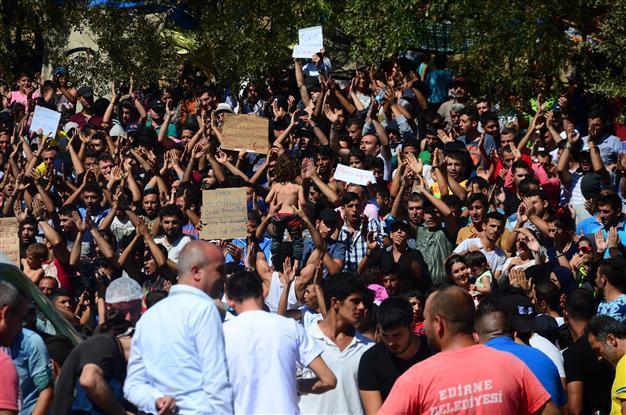More migrants arrive at Turkey-Greece border
EDİRNE – Doğan News Agency

AA Photo
Around 150 Syrian migrants have returned to Istanbul after authorities blocked their way to Greece in the border province of Edirne, but a similar number have arrived at the highway waiting to enter the province.Syrians have been camping near Edirne since late Sep. 15, after their attempts to enter the city on foot was blocked by gendarmerie and police teams at three different points.
On Sept. 17, around 200 Syrians returned to Istanbul after abandoning hope of entering the city before a prospective crossing to Greece with the ultimate aim of reaching northern Europe.
Hundreds have gathered at the city’s main bus terminal where they have staged a sit-in protest.
Police teams have been offering migrants food, but the group in the bus terminal refused to take the food and baby formula, saying they would conduct a hunger strike until they are allowed to enter the city.
Two representatives of around 2,000 Syrians met with Edirne Gov. Dursun Ali Şahin.
Representatives of the group warned the migrants not to take the offered food, saying, “We simply want to cross into Greece.”
Some of the migrants held cardboard placards saying, “We do not want any food,” in Turkish and English.
Two Turkish deputies from Edirne also called on Europe to accept the migrants. Republican People’s Party (CHP) Edirne deputy Erdin Bircan told the Sputnik website that the solution would be to open a route for migrants to allow them to enter Europe via Greece.
Bircan said Edirne residents would soon have problems with migrants due to cultural differences if they stay longer.
Justice and Development Party (AKP) Edirne Deputy Şemsettin Emir also said governments were continuing to discuss the issue.
“I hope a solution comes after these talks so that these people can finally have some happiness after three years,” Emir said, adding that the European Union should contribute to the costs of helping the refugees.
Prime Minister Ahmet Davutoğlu’s adviser Murtaza Yetiş also visited Syrian migrants waiting at Istanbul’s main bus terminal in Esenler.
Yetiş told reporters that migrants can stay in Edirne as long as they wanted, refuting claims that they tried to convince them to return to Istanbul.
“The Edirne Governor’s Office and [Edirne] Municipality have been hosting them from the very first day. There are 2 million Syrians in Turkey; we won’t lose anything by hosting 2,000 Syrians in Edirne,” Yetiş said Sept. 16.
Yetiş said migrants told them that they did not plan to cross to Greece when asked about the Turkish government’s response in the event of a march on the border with Turkey’s Aegean neighbor.
“They said ‘We do not have an intention of marching to Greece. We want to make a call to Europe to open the doors because our lives are in danger.’ They also said they wanted to meet the Turkish prime minister,” said Yetiş.
Yetiş’s remarks came hours after Şahin issued an ultimatum to the refugees, telling them they had three days to leave the province.
“The last group of around 2,000 people insists on not leaving. We have gotten no result from our persuasion efforts. I personally talked to their leaders and he said they wanted to go to Greece so that they can reach European countries. I told them that they could be [Edirne’s] guests for two or three days but they would eventually have to leave,” told Şahin a group of journalists on Sept. 16.
Another group of 800 migrants flocked to the TEM highway near the Edirne toll booths, and rejected the municipality’s attempts to install portable toilets, after having refused to take food on offer.
A young migrant chanted, “We are not here to stay permanently. We do not want food or toilets. We purely want Turkey to open the gates and let us cross into Greece, then Germany.” Following the protest, municipal staff ended efforts to install mobile toilets.
While some of the migrants chanted slogans and unfurled banners to protest security measures, migrants continued to wait at roadsides, terminals and streets.
















